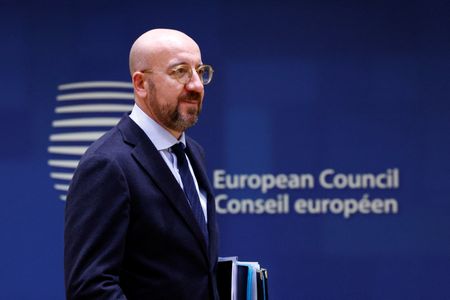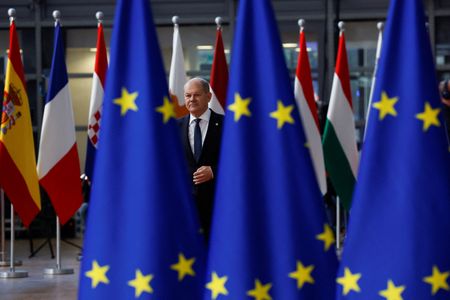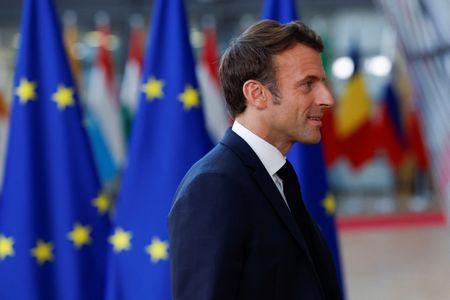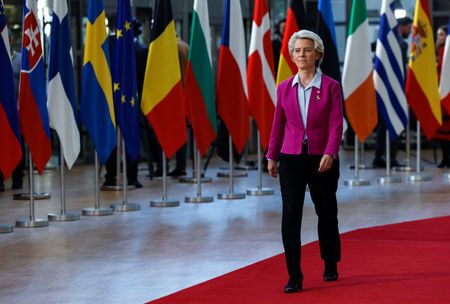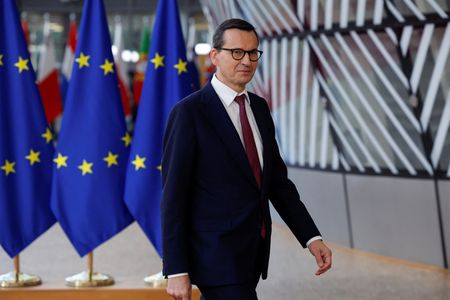By Kate Abnett and Sabine Siebold
BRUSSELS (Reuters) -European Union leaders ended another debate on the bloc’s response to the energy crunch without agreement on whether to cap gas prices, deciding in the early hours of Friday morning to keep examining options to put a ceiling on costs.
The EU is grappling with high energy prices driving inflation and raising the prospect of recession across the continent, a situation aggravated by Russia slashing gas flows following its February invasion of Ukraine.
The 27 countries have already agreed to fill gas storages and claw back revenues from energy firms to spend on helping consumers with crippling bills.
At a summit in Brussels on Thursday that ran late into the night, EU leaders eventually backed proposals made by the European Commission this week to launch an alternative price benchmark for liquefied natural gas and voluntary joint gas buying, although laws to make this happen will need to be negotiated over the coming weeks.
But after weeks of negotiations among EU country leaders, ministers and diplomats on the topic, the summit concluded at around 2am in Brussels without a final decision on an EU gas price cap.
“We do now have a very good and solid roadmap to keep on working on the topic of energy prices,” European Commission President Ursula von der Leyen said.
In their summit conclusions, EU leaders asked their ministers and the EU’s executive to “submit concrete decisions” on a “temporary dynamic price corridor on natural gas transactions” that would limit price spikes, and a price cap on gas used to generate electricity.
This should include a “cost and benefit analysis” of capping gas prices for the power sector, the conclusions said, reflecting some countries’ concerns that it could boost gas use or divert electricity exports to non-EU countries like Britain that do not have the cap.
The leaders did not give a timeframe for when decisions should be made on the price caps. EU energy ministers will discuss the measures on Tuesday.
A LONG NIGHT
The hours-long wrangling over energy prices reflected mounting tensions between countries over their joint response to Europe’s energy crunch. Several aired frustration on Thursday with Germany’s refusal to cap gas prices.
German Chancellor Olaf Scholz said the meeting outcome was a “good signal of solidarity”.
“We have set precise guidelines along which the energy ministers can work out the concrete details, unanimously. If this does not work, the Council (of EU country leaders) has to work at it again. But I do hope obviously that ministers succeed in finding unanimous agreement,” he said.
Germany, the biggest EU economy, leads a small camp that has so far resisted calls from 15 countries to cap gas prices, saying it would risk suppliers freezing Europe out, and reduce incentives for energy saving.
“We are asked to show solidarity in sharing energy but there is no solidarity on our calls for containing prices,” Italy’s outgoing prime minister, Mario Draghi, told his peers, according to an EU official familiar with the closed-door discussions.
Prime Minister Alexander de Croo of Belgium, which exports gas to neighbouring Germany, shared the frustration.
“Solidarity should not just be on supply – it should also be on prices,” he told the gathering, according to the official.
Spain and Portugal have already capped the price of gas used to produce power domestically, and France is keen to expand the scheme EU-wide. Separately on Thursday, the two also agreed with France to build a sea-based pipeline between Barcelona and Marseille.
Beyond disagreements over a ceiling on gas prices, the leaders were also at odds over spending plans by countries with the deepest pockets to help their industries and households through the energy crisis, which others complain are unfair and undermine competition on the bloc’s single market.
EU leaders said the bloc should use both national and EU-level tools to support their economies, with common European solutions “where appropriate”.
That wording was weaker than a previous draft of their conclusions, which had more heavily hinted that EU leaders would consider joint borrowing to fund their response to the energy crunch – a move two top EU officials called for this month after Germany unveiled a mammoth funding package to support its economy.
(Reporting by Kate Abnett and John Chalmers in BrusselsAdditional reporting by Jan Strupczewski, Charlotte van Campenhout, Marine Strauss, Gabriela Baczynska, Benoit Van Overstraeten, Sudip Kar-Gupta, Sabine Siebold and Philip BlenkinsopWriting by Gabriela Baczynska and John ChalmersEditing by Nick Macfie, William Maclean, Matthew Lewis and Lincoln Feast.)

